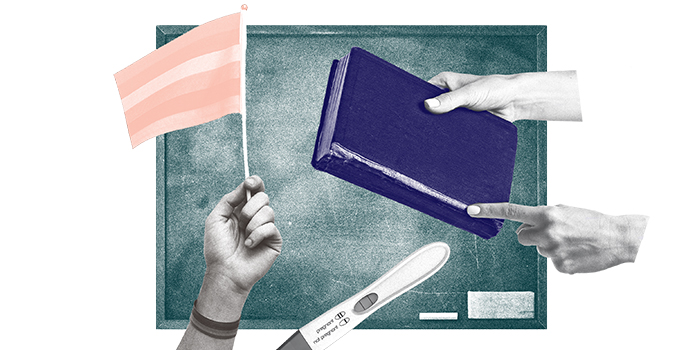Using Religion to Discriminate
The Ó◊” ”∆µworks in courts, legislatures, and communities to defend and preserve the individual rights and liberties that the Constitution and the laws of the United States guarantee everyone in this country.

If you've been discriminated against based on sexual orientation, gender identity, or HIV status, the Ó◊” ”∆µwants to hear about it.
The Latest
Explore More
What We're Focused On
-

Religion-Based Discrimination Against LGBTQ People
The Ó◊” ”∆µworks in courts, legislatures, and communities to defend and preserve the individual rights and liberties that the Constitution and the laws of the United States guarantee everyone in this country.
-

Religion-Based Discrimination Against Women
The Ó◊” ”∆µworks in courts, legislatures, and communities to defend and preserve the individual rights and liberties that the Constitution and the laws of the United States guarantee everyone in this country.
What's at Stake
With increasing frequency, we see institutions and individuals claiming a right to discriminate based on religious objections. In every case, businesses, universities, social services agencies, and others argue they do not have to comply with laws prohibiting discrimination. The claims arise in many contexts, including:
- Hobby Lobby and other for-profit businesses refusing to provide insurance coverage for contraception for their employees;
- A for-profit company objecting to providing its workers insurance coverage for drugs that prevent HIV;
- Teachers and students asserting a right to misgender students;
- Religiously affiliated schools seeking to deny LGBTQ people employment;
- Institutions claiming they are entitled to government funding and contracts even as they insist on discriminating; and
- Retail stores continuing to refuse to provide services to same-sex couples seeking items for their weddings or wedding receptions.
- While the situations may differ, one thing remains the same: Religion is being used as an excuse to discriminate against and harm others.
Instances of institutions and individuals claiming a right to discriminate in the name of religion are not new. In the 1960s, we saw objections to laws ending segregation in restaurants because of sincerely held beliefs that God wanted the races to be separate. We later saw religiously affiliated schools argue for segregation and at least one religiously affiliated university claim that the Constitution protected its right to refuse admission or continued enrollment to students who engaged in interracial dating. In the 1970s, we saw religiously affiliated schools claim a right to pay women less than men on the theory that men are heads of households. In those cases, the courts rejected the claims. We recognized that prohibiting discrimination was not about violating religious liberty; it was about ensuring fairness. It is no different today now that laws prohibiting discrimination expressly protect more of us, including LGBTQ people and disabled people, who call this country home.
Religious freedom in America means that we all have a right to our religious beliefs. However, this does not give us the right to use our religion to discriminate against and impose those beliefs on others who do not share them.
Through litigation, advocacy, and public education, the Ó◊” ”∆µworks to defend religious liberty and ensure that no one is discriminated against or denied services because of someone else‚Äôs religious beliefs.
With increasing frequency, we see institutions and individuals claiming a right to discriminate based on religious objections. In every case, businesses, universities, social services agencies, and others argue they do not have to comply with laws prohibiting discrimination. The claims arise in many contexts, including:
- Hobby Lobby and other for-profit businesses refusing to provide insurance coverage for contraception for their employees;
- A for-profit company objecting to providing its workers insurance coverage for drugs that prevent HIV;
- Teachers and students asserting a right to misgender students;
- Religiously affiliated schools seeking to deny LGBTQ people employment;
- Institutions claiming they are entitled to government funding and contracts even as they insist on discriminating; and
- Retail stores continuing to refuse to provide services to same-sex couples seeking items for their weddings or wedding receptions.
- While the situations may differ, one thing remains the same: Religion is being used as an excuse to discriminate against and harm others.
Instances of institutions and individuals claiming a right to discriminate in the name of religion are not new. In the 1960s, we saw objections to laws ending segregation in restaurants because of sincerely held beliefs that God wanted the races to be separate. We later saw religiously affiliated schools argue for segregation and at least one religiously affiliated university claim that the Constitution protected its right to refuse admission or continued enrollment to students who engaged in interracial dating. In the 1970s, we saw religiously affiliated schools claim a right to pay women less than men on the theory that men are heads of households. In those cases, the courts rejected the claims. We recognized that prohibiting discrimination was not about violating religious liberty; it was about ensuring fairness. It is no different today now that laws prohibiting discrimination expressly protect more of us, including LGBTQ people and disabled people, who call this country home.
Religious freedom in America means that we all have a right to our religious beliefs. However, this does not give us the right to use our religion to discriminate against and impose those beliefs on others who do not share them.
Through litigation, advocacy, and public education, the Ó◊” ”∆µworks to defend religious liberty and ensure that no one is discriminated against or denied services because of someone else‚Äôs religious beliefs.

